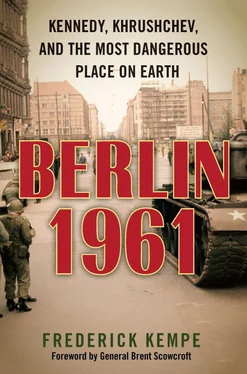From there they phoned General Clay over a secure line in his map room in West Berlin. Clay had been told Bundy was on the line and wished to speak with him, so he was taken aback when he heard the voice of Kennedy himself.
“Hello, Mr. President,” Clay said loudly, abruptly ending the buzz behind him in the command center.
“How are things up there?” Kennedy asked in a voice designed to be cool and relaxed.
Everything was under control, Clay told him. “We have ten tanks at Checkpoint Charlie,” he said. “The Russians have ten tanks there, too, so now we’re equal.”
An aide then handed General Clay a note.
“Mr. President, I’ve got to change my figures. I’ve just been told that the Russians have twenty more tanks coming up, which would give them exactly the total number of tanks that we have in Berlin. So we’ll bring up our remaining twenty. Don’t worry about it, Mr. President. They’ve matched us tank for tank. This is further evidence to me that they don’t intend to do anything,” he said.
The president could do the math as well. Should the Soviets escalate their numbers further, Clay lacked the conventional capability to respond. Kennedy scanned the anxious faces of his men in the room. He propped his feet up on the table, attempting to send a message of composure to men who feared matters were spinning out of control.
“Well, that’s all right,” said the president to Clay. “Don’t lose your nerve.”
“Mr. President,” responded Clay with characteristic candor, “we’re not worried about our nerves. We’re worrying about those of you people in Washington.”
Ahalf-century has passed since the Berlin Wall rose, midway through the first year of the Kennedy administration, yet it is only now that we have sufficient distance and access to personal accounts, oral histories, and newly declassified documents in the U.S., Germany, and Russia to more confidently tell the story of the forces that shaped the historic events of 1961. Like most epic dramas, it is a story best told through time (the course of a calendar year), place (Berlin and the world capitals that shaped its fortune), and particularly people.
And few relationships between the two leading figures of their day have been as psychologically fraught or involved characters of such sharp contrasts and colliding ambitions as John F. Kennedy and Nikita Khrushchev.
Kennedy walked onto the world stage in January 1961 after winning the closest U.S. election since 1916 on a platform of “getting America moving again” following two terms of Republican President Dwight D. Eisenhower, whom he had accused of allowing Soviet communists to gain a dangerous edge both economically and militarily. He was the youngest president in American history, a forty-three-year-old American son of privilege, raised by a multimillionaire father of boundless ambition whose favored son, Joseph Jr., had died at war. Though handsome, charismatic, and a brilliant orator, the new president suffered afflictions that ranged from the adrenal insufficiency of Addison’s disease to often crippling back pain exacerbated by a war injury. Though outwardly confident, he would be wracked by uncertainty about how best to engage the Soviets. He was determined to be a great president of the caliber of Abraham Lincoln and Franklin Delano Roosevelt, yet he worried they had only found their place in history through war. In the 1960s he knew that would mean nuclear devastation.
An American president’s inaugural year often can be perilous, even when its occupant is a more experienced one than Kennedy, as the burdens of a dangerous world are passed from one administration to another. And during Kennedy’s first five months in office, he would suffer several self-inflicted wounds, from his mishandling of the Bay of Pigs invasion to the Vienna Summit, where by his own account Khrushchev had outmaneuvered and brutalized him. Yet nowhere were the stakes higher for him than in Berlin, the central stage for U.S.–Soviet competition.
By temperament and upbringing, Khrushchev was Kennedy’s opposite. The sixty-seven-year-old grandson of a serf and son of a coal miner was impulsive where Kennedy was indecisive, and bombastic where Kennedy was measured. His moods alternated between the deep-seated insecurity of a man who had been illiterate until his twenties and the bold confidence of someone who had risen to power against impossible odds while rivals faded, were purged, or were killed. Complicit in his mentor Joseph Stalin’s crimes before renouncing Stalin after his death, in 1961 Khrushchev was vacillating between his instinct for reform and better relations with the West and his habit of authoritarianism and confrontation. It was his conviction that he could best advance Soviet interests through peaceful coexistence and competition with the West, yet at the same time pressures were growing on him to escalate tensions with Washington and by whatever means necessary stop the outflow of refugees that threatened to trigger East Germany’s implosion.
Between the establishment of the East German state in 1949 and 1961, one of every six individuals—2.8 million people—had left as refugees. That total swelled to 4 million when one included those who had fled the Soviet-occupied zone between 1945 and 1949. The exodus was emptying the country of its most talented and motivated people.
In addition, Khrushchev was racing against the clock as 1961 began. He faced a crucial Communist Party Congress in October, at which he had reason to fear his enemies would unseat him if he failed to fix Berlin by then. When Khrushchev told Kennedy during their Vienna Summit that Berlin was “the most dangerous place in the world,” what he meant was that it was the spot most likely to trigger a nuclear superpower conflict. Beyond that, Khrushchev knew that if he botched Berlin, his rivals in Moscow would destroy him.
The contest between the key supporting German actors to Khrushchev and Kennedy was just as charged, an asymmetrical conflict between East German leader Walter Ulbricht and his failing country of seventeen million people, and West German Chancellor Konrad Adenauer and his rapidly rising economic power of sixty million.
For Ulbricht, the year would be of even greater existential importance than it was for either Kennedy or Khrushchev. The so-called German Democratic Republic, as East Germany was officially known, was his life’s work, and at age sixty-seven he knew that without radical remedy it was heading for economic and political collapse. The greater that danger, the more intensively he schemed to prevent it. Ulbricht’s leverage in Moscow was growing in rough proportion to his country’s instability because of the Kremlin’s fear that East German failure would cause ripples across the Soviet empire.
Across the border in West Germany, the country’s first and only chancellor, Konrad Adenauer, was, at age eighty-five and after three terms, waging war simultaneously against his own mortality and against political opponent Willy Brandt, who was West Berlin’s mayor. Brandt’s Social Democratic Party represented to Adenauer the unacceptable danger of leftist takeover in the coming September elections. However, Adenauer considered Kennedy himself to be the greatest threat to his legacy of a free and democratic West Germany.
By 1961, Adenauer’s place in history would seem to have been assured through the phoenix-like rise of West Germany from the Third Reich’s ashes. Yet Kennedy considered him a spent force upon whom his U.S. predecessors had relied too much at the expense of closer relations with Moscow. Adenauer, in turn, feared Kennedy lacked the character and backbone to stand up to the Soviets during what he was convinced would be a decisive year.
The story of Berlin 1961 is told in three parts.
Читать дальше











